Analysis of Family Strength Concept in Child, Youth and Family Care
VerifiedAdded on 2022/09/26
|5
|1186
|24
Essay
AI Summary
This essay delves into the concept of family strength within the context of child, youth, and family healthcare. It emphasizes the importance of family cohesion, individual growth, and the psychological, social, and economic functions of a strong family. The essay highlights how nurses can utilize the concept of family strength to develop effective nursing care plans, considering family values, beliefs, and their ability to manage change. It discusses the impact of family dynamics, including socioeconomic status and caregiver roles, on child and youth health outcomes, and the significance of early childhood experiences. The author believes that assessing family strength is crucial for providing appropriate support and improving the health outcomes of children and young adults. The essay references various research articles to support the arguments and provides a comprehensive understanding of family-centered care.
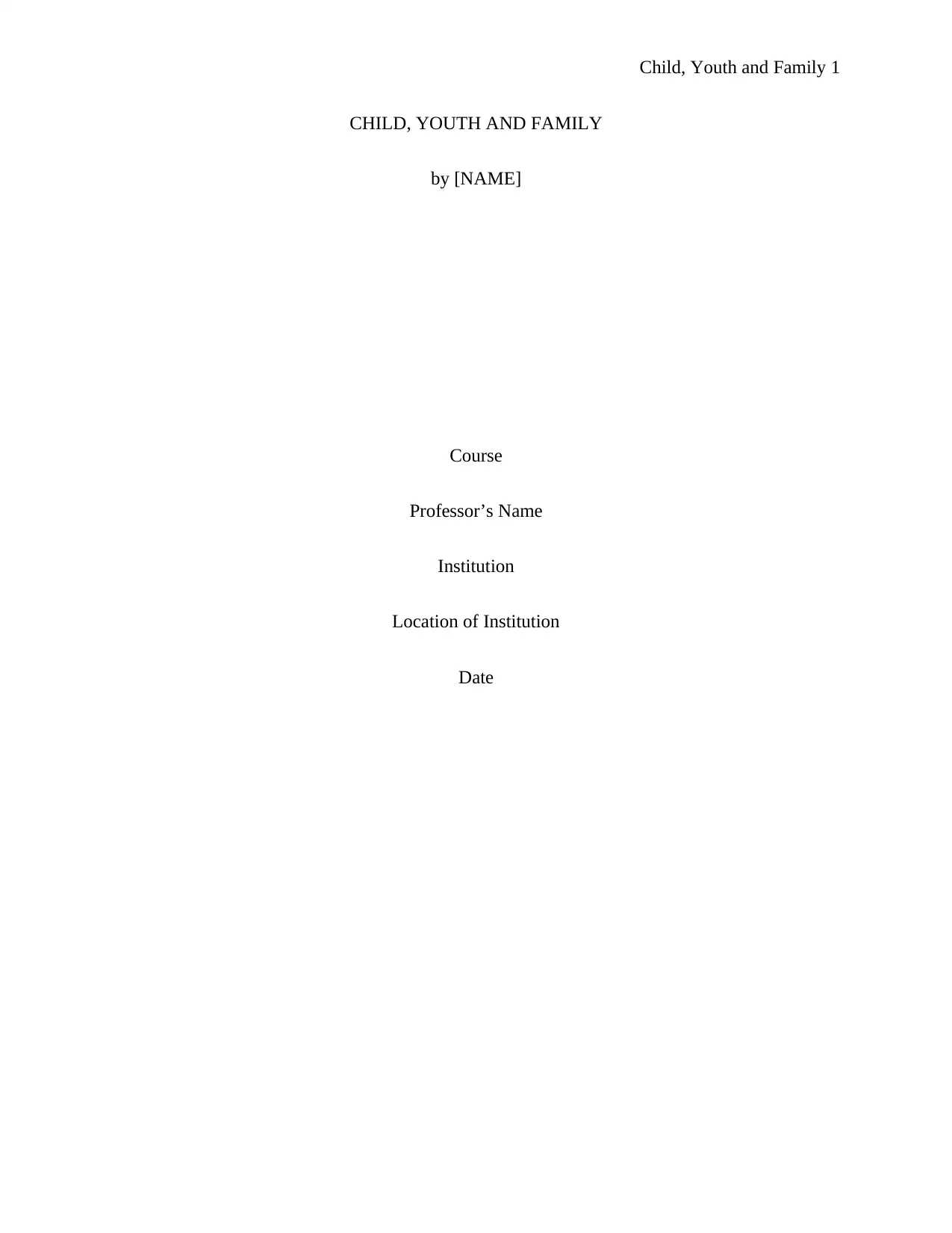
Child, Youth and Family 1
CHILD, YOUTH AND FAMILY
by [NAME]
Course
Professor’s Name
Institution
Location of Institution
Date
CHILD, YOUTH AND FAMILY
by [NAME]
Course
Professor’s Name
Institution
Location of Institution
Date
Paraphrase This Document
Need a fresh take? Get an instant paraphrase of this document with our AI Paraphraser
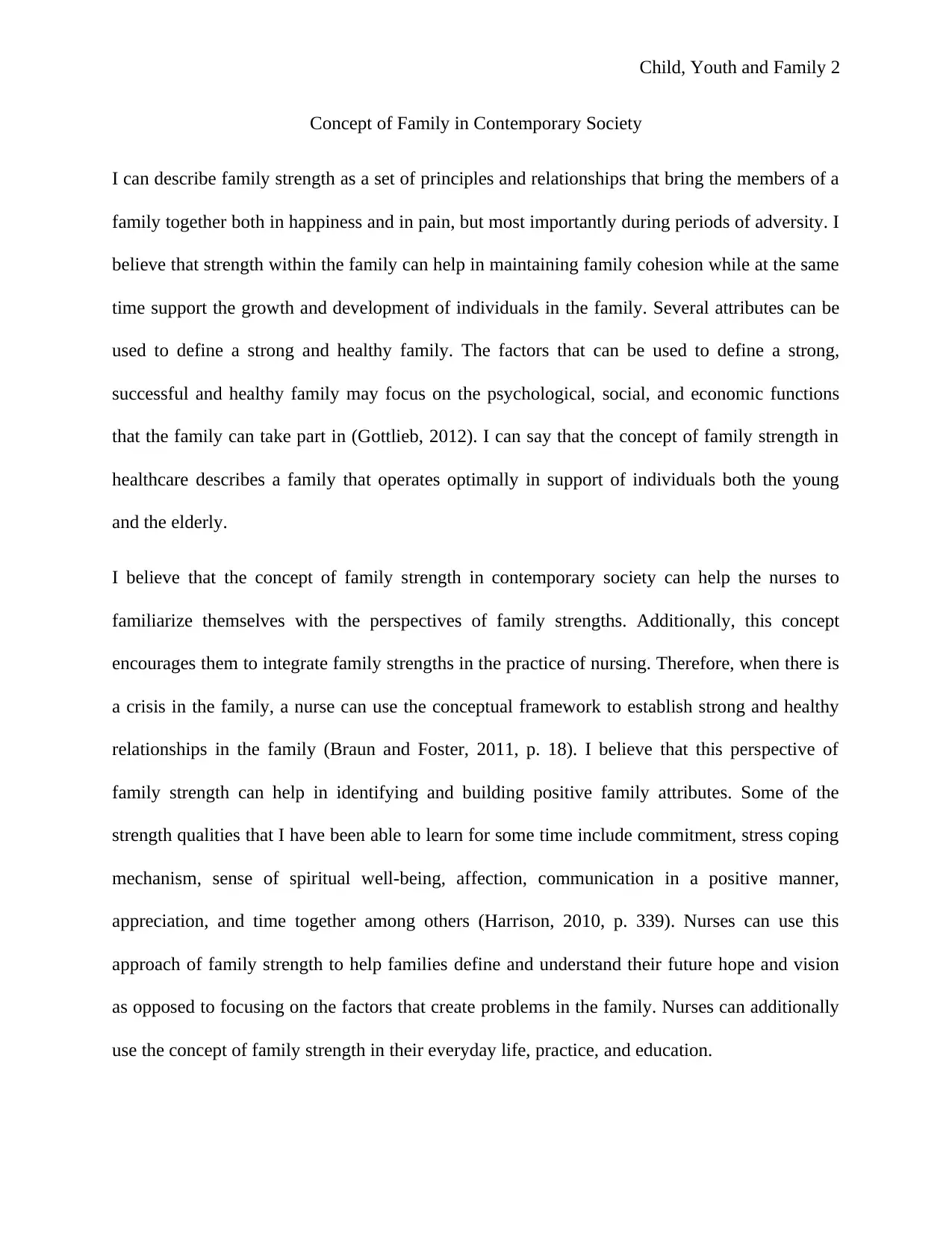
Child, Youth and Family 2
Concept of Family in Contemporary Society
I can describe family strength as a set of principles and relationships that bring the members of a
family together both in happiness and in pain, but most importantly during periods of adversity. I
believe that strength within the family can help in maintaining family cohesion while at the same
time support the growth and development of individuals in the family. Several attributes can be
used to define a strong and healthy family. The factors that can be used to define a strong,
successful and healthy family may focus on the psychological, social, and economic functions
that the family can take part in (Gottlieb, 2012). I can say that the concept of family strength in
healthcare describes a family that operates optimally in support of individuals both the young
and the elderly.
I believe that the concept of family strength in contemporary society can help the nurses to
familiarize themselves with the perspectives of family strengths. Additionally, this concept
encourages them to integrate family strengths in the practice of nursing. Therefore, when there is
a crisis in the family, a nurse can use the conceptual framework to establish strong and healthy
relationships in the family (Braun and Foster, 2011, p. 18). I believe that this perspective of
family strength can help in identifying and building positive family attributes. Some of the
strength qualities that I have been able to learn for some time include commitment, stress coping
mechanism, sense of spiritual well-being, affection, communication in a positive manner,
appreciation, and time together among others (Harrison, 2010, p. 339). Nurses can use this
approach of family strength to help families define and understand their future hope and vision
as opposed to focusing on the factors that create problems in the family. Nurses can additionally
use the concept of family strength in their everyday life, practice, and education.
Concept of Family in Contemporary Society
I can describe family strength as a set of principles and relationships that bring the members of a
family together both in happiness and in pain, but most importantly during periods of adversity. I
believe that strength within the family can help in maintaining family cohesion while at the same
time support the growth and development of individuals in the family. Several attributes can be
used to define a strong and healthy family. The factors that can be used to define a strong,
successful and healthy family may focus on the psychological, social, and economic functions
that the family can take part in (Gottlieb, 2012). I can say that the concept of family strength in
healthcare describes a family that operates optimally in support of individuals both the young
and the elderly.
I believe that the concept of family strength in contemporary society can help the nurses to
familiarize themselves with the perspectives of family strengths. Additionally, this concept
encourages them to integrate family strengths in the practice of nursing. Therefore, when there is
a crisis in the family, a nurse can use the conceptual framework to establish strong and healthy
relationships in the family (Braun and Foster, 2011, p. 18). I believe that this perspective of
family strength can help in identifying and building positive family attributes. Some of the
strength qualities that I have been able to learn for some time include commitment, stress coping
mechanism, sense of spiritual well-being, affection, communication in a positive manner,
appreciation, and time together among others (Harrison, 2010, p. 339). Nurses can use this
approach of family strength to help families define and understand their future hope and vision
as opposed to focusing on the factors that create problems in the family. Nurses can additionally
use the concept of family strength in their everyday life, practice, and education.
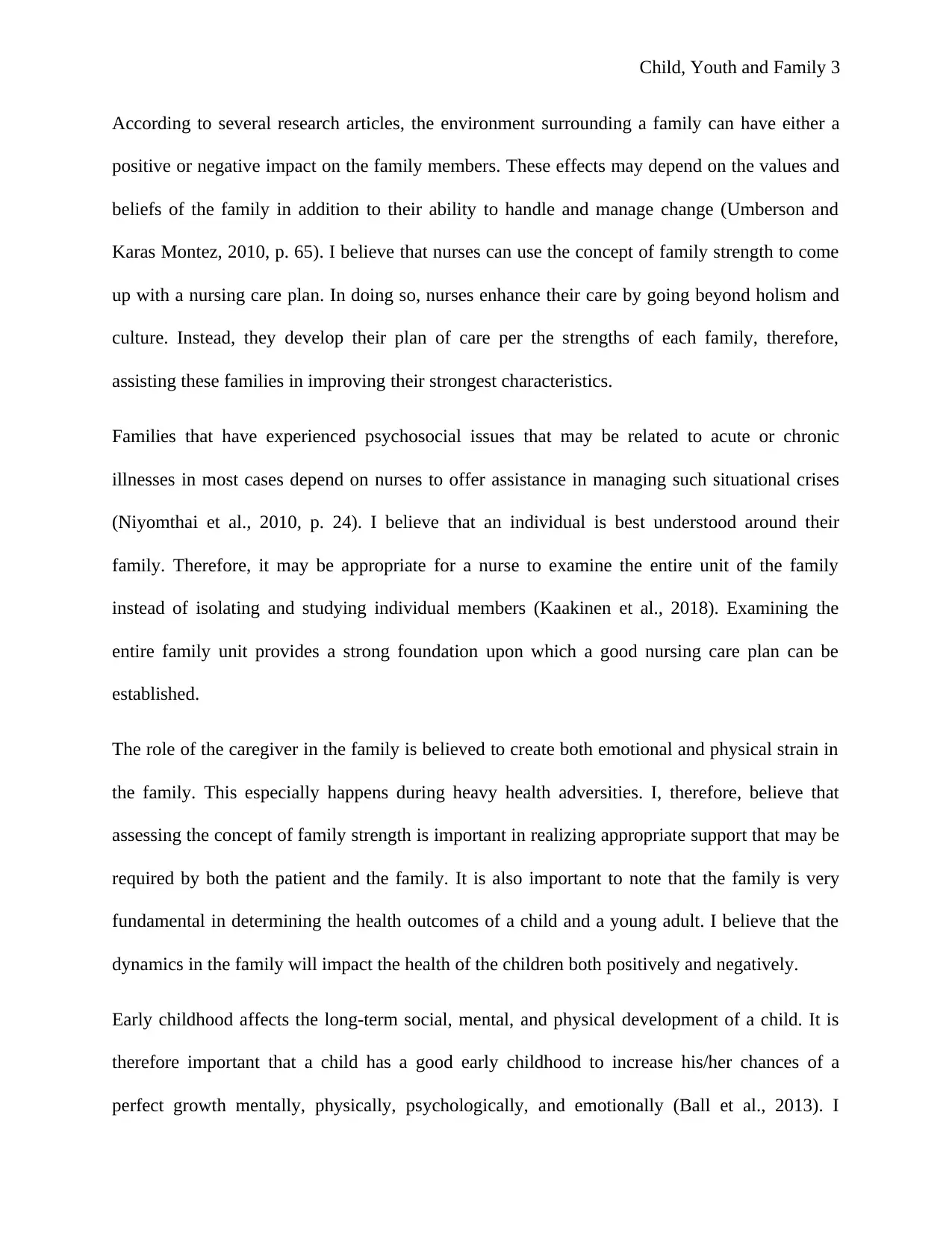
Child, Youth and Family 3
According to several research articles, the environment surrounding a family can have either a
positive or negative impact on the family members. These effects may depend on the values and
beliefs of the family in addition to their ability to handle and manage change (Umberson and
Karas Montez, 2010, p. 65). I believe that nurses can use the concept of family strength to come
up with a nursing care plan. In doing so, nurses enhance their care by going beyond holism and
culture. Instead, they develop their plan of care per the strengths of each family, therefore,
assisting these families in improving their strongest characteristics.
Families that have experienced psychosocial issues that may be related to acute or chronic
illnesses in most cases depend on nurses to offer assistance in managing such situational crises
(Niyomthai et al., 2010, p. 24). I believe that an individual is best understood around their
family. Therefore, it may be appropriate for a nurse to examine the entire unit of the family
instead of isolating and studying individual members (Kaakinen et al., 2018). Examining the
entire family unit provides a strong foundation upon which a good nursing care plan can be
established.
The role of the caregiver in the family is believed to create both emotional and physical strain in
the family. This especially happens during heavy health adversities. I, therefore, believe that
assessing the concept of family strength is important in realizing appropriate support that may be
required by both the patient and the family. It is also important to note that the family is very
fundamental in determining the health outcomes of a child and a young adult. I believe that the
dynamics in the family will impact the health of the children both positively and negatively.
Early childhood affects the long-term social, mental, and physical development of a child. It is
therefore important that a child has a good early childhood to increase his/her chances of a
perfect growth mentally, physically, psychologically, and emotionally (Ball et al., 2013). I
According to several research articles, the environment surrounding a family can have either a
positive or negative impact on the family members. These effects may depend on the values and
beliefs of the family in addition to their ability to handle and manage change (Umberson and
Karas Montez, 2010, p. 65). I believe that nurses can use the concept of family strength to come
up with a nursing care plan. In doing so, nurses enhance their care by going beyond holism and
culture. Instead, they develop their plan of care per the strengths of each family, therefore,
assisting these families in improving their strongest characteristics.
Families that have experienced psychosocial issues that may be related to acute or chronic
illnesses in most cases depend on nurses to offer assistance in managing such situational crises
(Niyomthai et al., 2010, p. 24). I believe that an individual is best understood around their
family. Therefore, it may be appropriate for a nurse to examine the entire unit of the family
instead of isolating and studying individual members (Kaakinen et al., 2018). Examining the
entire family unit provides a strong foundation upon which a good nursing care plan can be
established.
The role of the caregiver in the family is believed to create both emotional and physical strain in
the family. This especially happens during heavy health adversities. I, therefore, believe that
assessing the concept of family strength is important in realizing appropriate support that may be
required by both the patient and the family. It is also important to note that the family is very
fundamental in determining the health outcomes of a child and a young adult. I believe that the
dynamics in the family will impact the health of the children both positively and negatively.
Early childhood affects the long-term social, mental, and physical development of a child. It is
therefore important that a child has a good early childhood to increase his/her chances of a
perfect growth mentally, physically, psychologically, and emotionally (Ball et al., 2013). I
⊘ This is a preview!⊘
Do you want full access?
Subscribe today to unlock all pages.

Trusted by 1+ million students worldwide
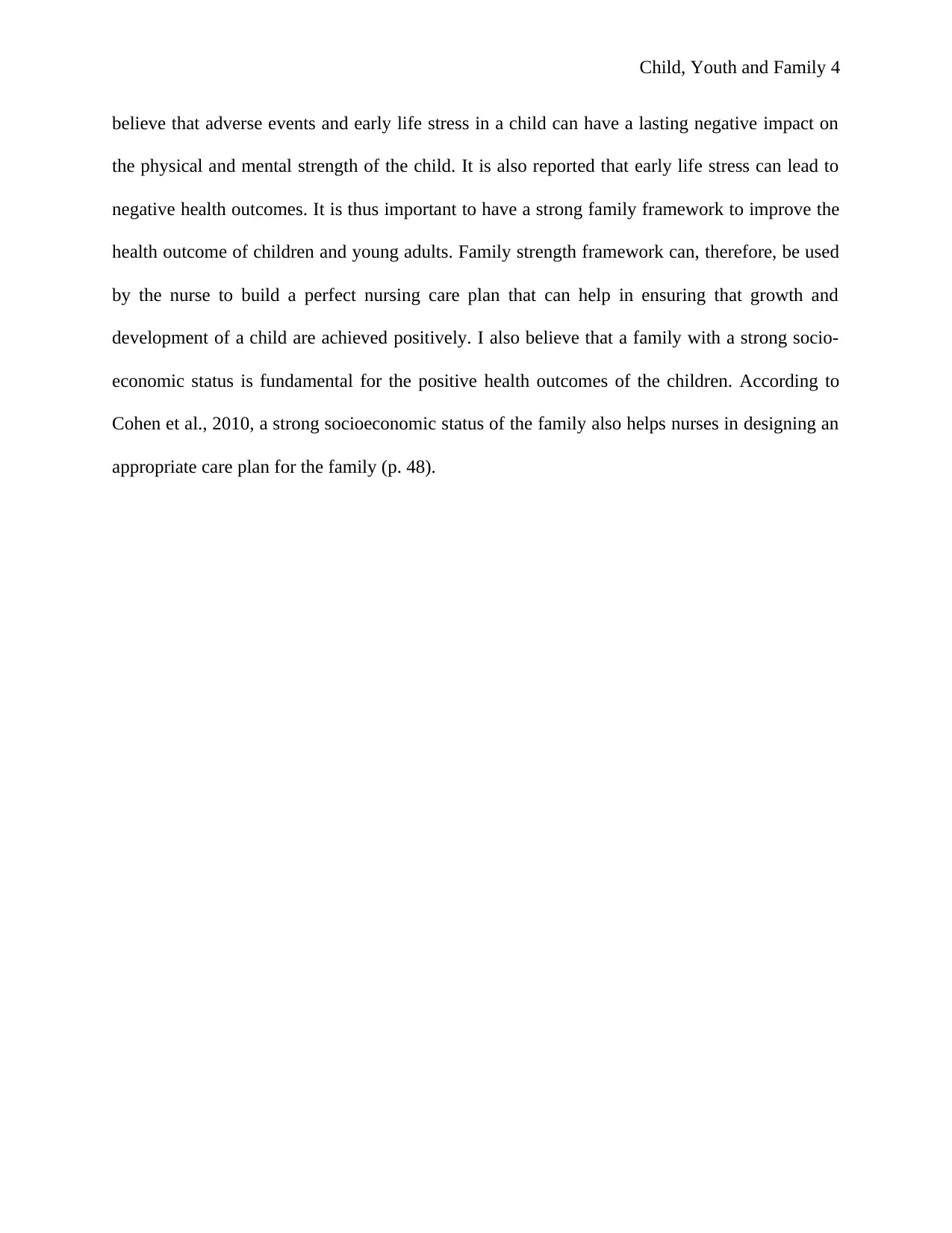
Child, Youth and Family 4
believe that adverse events and early life stress in a child can have a lasting negative impact on
the physical and mental strength of the child. It is also reported that early life stress can lead to
negative health outcomes. It is thus important to have a strong family framework to improve the
health outcome of children and young adults. Family strength framework can, therefore, be used
by the nurse to build a perfect nursing care plan that can help in ensuring that growth and
development of a child are achieved positively. I also believe that a family with a strong socio-
economic status is fundamental for the positive health outcomes of the children. According to
Cohen et al., 2010, a strong socioeconomic status of the family also helps nurses in designing an
appropriate care plan for the family (p. 48).
believe that adverse events and early life stress in a child can have a lasting negative impact on
the physical and mental strength of the child. It is also reported that early life stress can lead to
negative health outcomes. It is thus important to have a strong family framework to improve the
health outcome of children and young adults. Family strength framework can, therefore, be used
by the nurse to build a perfect nursing care plan that can help in ensuring that growth and
development of a child are achieved positively. I also believe that a family with a strong socio-
economic status is fundamental for the positive health outcomes of the children. According to
Cohen et al., 2010, a strong socioeconomic status of the family also helps nurses in designing an
appropriate care plan for the family (p. 48).
Paraphrase This Document
Need a fresh take? Get an instant paraphrase of this document with our AI Paraphraser
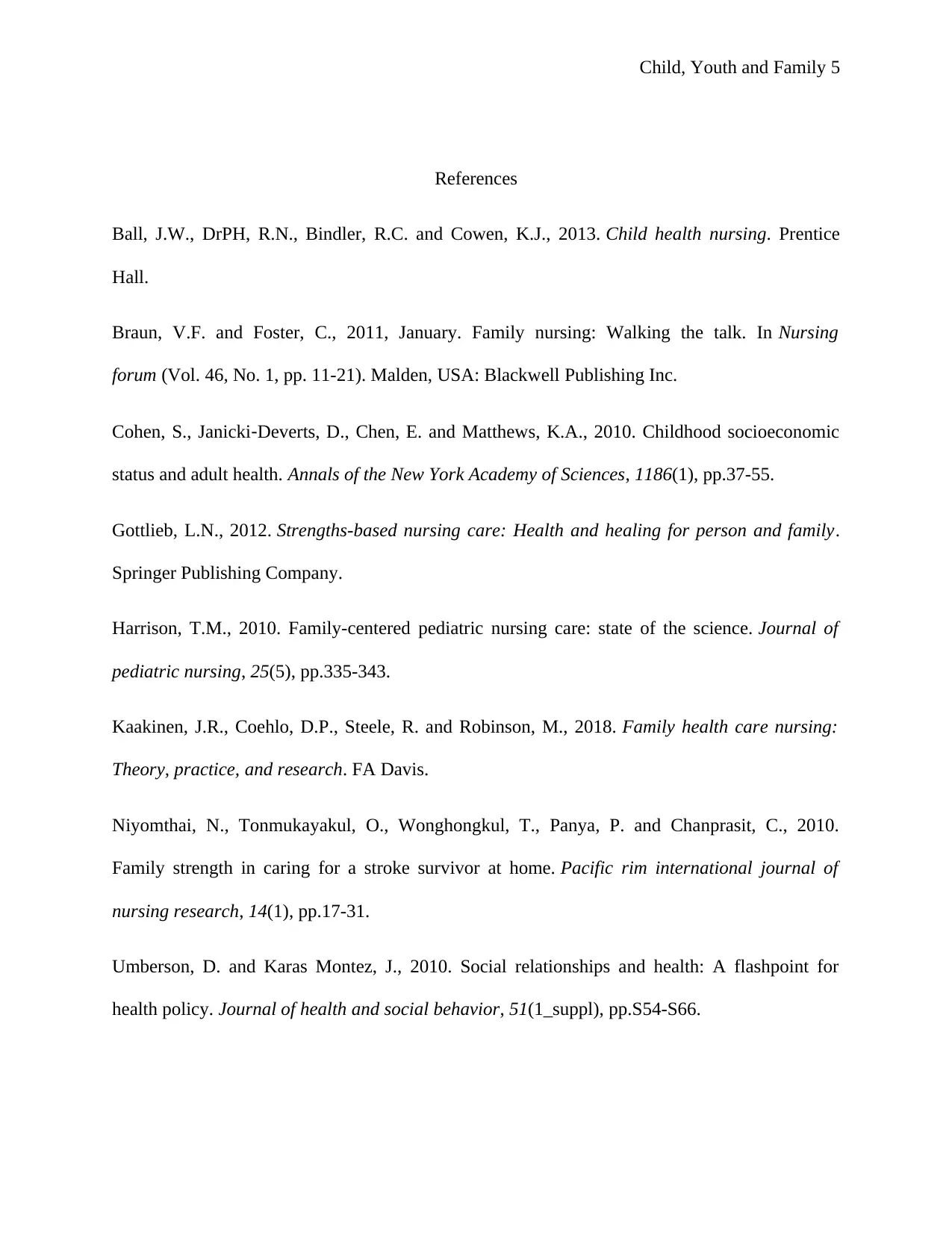
Child, Youth and Family 5
References
Ball, J.W., DrPH, R.N., Bindler, R.C. and Cowen, K.J., 2013. Child health nursing. Prentice
Hall.
Braun, V.F. and Foster, C., 2011, January. Family nursing: Walking the talk. In Nursing
forum (Vol. 46, No. 1, pp. 11-21). Malden, USA: Blackwell Publishing Inc.
Cohen, S., Janicki‐Deverts, D., Chen, E. and Matthews, K.A., 2010. Childhood socioeconomic
status and adult health. Annals of the New York Academy of Sciences, 1186(1), pp.37-55.
Gottlieb, L.N., 2012. Strengths-based nursing care: Health and healing for person and family.
Springer Publishing Company.
Harrison, T.M., 2010. Family-centered pediatric nursing care: state of the science. Journal of
pediatric nursing, 25(5), pp.335-343.
Kaakinen, J.R., Coehlo, D.P., Steele, R. and Robinson, M., 2018. Family health care nursing:
Theory, practice, and research. FA Davis.
Niyomthai, N., Tonmukayakul, O., Wonghongkul, T., Panya, P. and Chanprasit, C., 2010.
Family strength in caring for a stroke survivor at home. Pacific rim international journal of
nursing research, 14(1), pp.17-31.
Umberson, D. and Karas Montez, J., 2010. Social relationships and health: A flashpoint for
health policy. Journal of health and social behavior, 51(1_suppl), pp.S54-S66.
References
Ball, J.W., DrPH, R.N., Bindler, R.C. and Cowen, K.J., 2013. Child health nursing. Prentice
Hall.
Braun, V.F. and Foster, C., 2011, January. Family nursing: Walking the talk. In Nursing
forum (Vol. 46, No. 1, pp. 11-21). Malden, USA: Blackwell Publishing Inc.
Cohen, S., Janicki‐Deverts, D., Chen, E. and Matthews, K.A., 2010. Childhood socioeconomic
status and adult health. Annals of the New York Academy of Sciences, 1186(1), pp.37-55.
Gottlieb, L.N., 2012. Strengths-based nursing care: Health and healing for person and family.
Springer Publishing Company.
Harrison, T.M., 2010. Family-centered pediatric nursing care: state of the science. Journal of
pediatric nursing, 25(5), pp.335-343.
Kaakinen, J.R., Coehlo, D.P., Steele, R. and Robinson, M., 2018. Family health care nursing:
Theory, practice, and research. FA Davis.
Niyomthai, N., Tonmukayakul, O., Wonghongkul, T., Panya, P. and Chanprasit, C., 2010.
Family strength in caring for a stroke survivor at home. Pacific rim international journal of
nursing research, 14(1), pp.17-31.
Umberson, D. and Karas Montez, J., 2010. Social relationships and health: A flashpoint for
health policy. Journal of health and social behavior, 51(1_suppl), pp.S54-S66.
1 out of 5
Related Documents
Your All-in-One AI-Powered Toolkit for Academic Success.
+13062052269
info@desklib.com
Available 24*7 on WhatsApp / Email
![[object Object]](/_next/static/media/star-bottom.7253800d.svg)
Unlock your academic potential
Copyright © 2020–2025 A2Z Services. All Rights Reserved. Developed and managed by ZUCOL.




